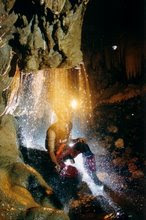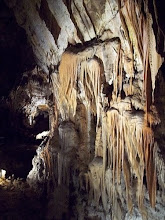ADVENTURE TOURISM
A WAY TO APPRECIATE NATURE
R.K.T. Ko*
Lecturer and Consultant in Ecotourism and Nature
Tourism.
Keynote paper in the Indonesian Travel Mart
Discussion Panel at the Jakarta Convention Center
September 12, 2002.
What is meant by Adventure Tourism? Before the
eighties we only know Nature and Culture Tourism.
Afterwards nearly every year someone, somewhere, creates
new names for Nature Tourism, differentiating it in back-to-
nature tourism, bird watching, mountaineering, jungle
trekking, river wading, rafting, kayaking, cycling, diving,
rock climbing, caving or speleotourism, geotourism,
volcanotourism, adventure tourism, and latelyecotourism. In
Indonesia people even create the term tea-walk, which is
actually walking on small paths crisscrossing tea
plantations. In the future probably there will be rubber-walk,
coffee walk, sugar cane walk, and who knows, a creative but
eerie midnight graveyard walk. . . . . . ..
All those newly created terms denote either
difference in activities or difference in tourism objectives.
Adventure Tourism is actually a loose term, which is
subjectively or objectively applied. For city slickers
abseiling down a precipitous rock face, 100 m high is really
a great adventure. For a mountaineer or rock-climber and
caver, such a feat is a piece of cake. Any type of outdoor
the sedentary workaholics. Not so for the highly motivated,
determined nature explorers, every time seeking more
difficult terrains to overcome.
Adventure tourists are no everyday tourists. They do
not belong and are even obnoxious to be considered
"ordinary" tourists. They are indeed a special breed of
people, some of them are even proud to be recognized as
"machos".
They have usually one thing in common: to
recognize or accept nature as a lure to
exploit their. skill and daringness, consciously taking risks,
and thereby proving to themselves capable to overcome
diverse physical obstacles in a graceful way. Urging and
forcing themselves to their limit of physical skill (and
tolerance) is one way, actual possession of the needed
equipment, physical agility, health condition and
psychological preparedness, experience, knowledge of
prevailing conditions, are other crucial aspects.
Disparity between the skill of the adventurer or
outdoor activist and the difficulty of a nature obstacle,
unpreparedness or to be even more specific,.
underestimation of the difficulty scale combined with
overestimation of one's skill and ability, is the
stereotypical, recurring cause of inconvenient incidents or
serious, frequently fatal accidents in thy great outdoors.
A slight mismatch between an individual's wish to
"conquer" nature and actual difficult situation beyond his
skills and physical condition, usually leads to an incident. A
gross discrepancy between his skills, physical condition,
judgment, preparedness and experience - as repeatedly
proven - and nature's freaks or its so oftentimes misjudged
difficult obstacles, usually leads to accidents, frequently
fatal.
Analyses of all reported accidents and incidences
lead to the conclusion that all mishaps are due to human
error
Keep in mind that nearly all reported accidents
happened among Indonesian nature explorers but seldom
guided tourists. Fatal accidents did happen due to flooding
among Singapore Tourists visiting Madakaripura Waterfall
in East Java near the Bromo volcano.
Until now I have put forward the antropogenic side
of tourism. The consumer's oriented approach. A policy
to protect the visitors. But it is mandatory to also consider
the visitor's impact on the natural resources. The resource
oriented approach. These two policies must always be kept
in balance. Overvisit by, and overprotection of visitors, and
negligence of negative impacts by visitors on the natural
resources, ftequently lead to deterioration of the tourist
attraction. Quality of the tourist resort diminish in direct
proportion with quantity of tourists, if not regulated,
monitored and managed properly.
Indonesia's diverse and gorgeous nature is not yet
identified and properly developed as a sustainable nature
resource. Unfortunately it's unique biodiversity and
geodiversity is being destroyed in an uncontrollable,
unpredictable, disastrous and fast rate, due to excessive and
widespread legal and illegal mining for minerals and
logging.
A handful of nature loving people, very concerned
about protecting Indonesia's wild life and scenic values,
backed by scientists, professionals and bureaucrats in
forestry, biodiversity, ecology, nature conservation,
geomorphology, hydrology, and other relevant sciences are
facing an ever escalating battle against unscrupulous
individuals, who consider exploitation of all available
natural resources as the one and only way to get rich quickly
or improve the country's economy.
This type of unlimited exploitation without any
regard towards negative environment impact is calamitously
in agreement with the policy of many local governments,
which at present are in an euphoric state, obtaining the
autonomy in developing their economic potential. Lack of
experts in interrelated fields - an internationally recognized
prerequisite to perform the environmental impact analyses
before exploiting nature for whatever cause - or simply and
incredulously ignoring the existence of other more
important non-mining aspects of natural resources, are two
reasons why many local governments in Indonesia have
started a futile, irreparable, irretrievable and at times even
irrational over-exploitation of its natural resources.
Adventure tourism, more so ecotourism, can never
take place in a totally, even partially destroyed nature
environment, where elements of geology, plant and animal
life are forever destroyed or annihilated. This is one of the
reasons, a strong, never ending, never decreasing, consistent
lobbying is needed by all stakeholders in nature and
ecotourism, and by all people concerned with conserving
Indonesia's beautiful countryside and nature resources for
future generations. Educating young people to appreciate
nature and to conserve it is also of utmost importance and
must start early, at the elementary schools.
So it is relevant to discuss planning and organizing
nature tourism in line with instilling awareness of nature's
beauty, multiple values, fragility and the necessity to protect
it. Only programs of nature adventure tourism, which stress
on understanding nature and nature conservation have a
place in Indonesia. So it should not be adventurism for the
sake of adventurism only, but, as it is applied internationally
by developed countries, adventure with a eye and a heart on
nature's splendor and individual's safety, at all times.....
It is a globally accepted policy to utilize nature in a
sensible and sustainable way by adopting the principle to
apply the consumer's oriented and the resource oriented
approach. Visitor's safety should be balanced by a similar
concern to protect the nature resource being visited.
Everyone visiting nature should be aware that human impact
on the fragile natural environment with its unique bio- and
geodivesity and its balanced ecosystem, can cause a
transient or permanent impact. The more so, if great
numbers of tourists trot on a limited area of a nature
formation. A nature resource's dynamic carrying capacity
should be identified or calculated and principles of zonation
applied.
Monitoring visitor's impact on natural resources,
using suitable parameters, should be a policy adhered to, by
all stakeholders and nature tourism managers.
Whatever the situation, adventure tourism still has a
fantastic potential in Indonesia if identified early and
properly, and developed professionally by knowledgeable
persons, who will consider the training and education of the
needed personnel , namely tour planners, tour conductors
and site managers as a conditio sine qua non. Mind that off-
road or mountain cycling, motor cycling, off road car racing
and hunting is still the most popular adventure tourism, not
yet developed intensively. Also outdoor education for young
people as a stronghold for adventure tourism
What is needed most in Indonesia?
1. Outdoor Education for young people, to let them
appreciate nature. Understanding nature can never be
substituted by classroom activities. Awareness of
nature's ffagility, the ethical and moral duty to conserve
nature, self-awareness, understanding the web of life can
only be achieved trough a conceptual and professionally
performed outdoor education program. This is of special
importance to the urban youth. The more so for
Singaporean youth who's nation has no jungles for
trekking, rivers for rafting, caves for spelunking,
mountains for climbing.
2. Training outdoor activities tour planners and
conductors. Syllabi should include outdoor cooking,
emergency medicine training, different kinds of outdoor
activity skills and techniques, proper use of needed
equipment, survival techniques, orienteering.









